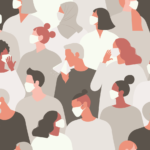In a recent Public Discourse essay, I argued that the current pandemic reveals that many Americans (not all, certainly) have forgotten what it means to be citizens. They have jettisoned their commitment to our civic project in favor of a radical variety of individualism. Not the hale and hearty self-reliance of American mythology, not Jefferson’s yeoman farmer or the sod-buster of Willa Cather’s fiction, but a falsehood. Rather than understand the individual within thick networks of relationships and duties, this error views us as unencumbered—as denuded of the actual human relations and obligations that give us meaning and purpose. This version of individualism suggests that we are bereft of a given identity—or of any identity other than that of a biological unit of life—and that from that place of emptiness we proceed to create the existence and commitments we wish. Before we are men or women, we are simply individuals (and then, astonishingly, we define our sex and gender for ourselves). Before we are husband or wife, daughter or son, we are simply individuals (who construct our own understandings of marriage and family).
People formed to believe and cherish such a fiction will struggle to view themselves as members who participate in and contribute to the common good, or so I suggested; and there is a rich irony in our cultured elites’ haughtily exhorting us to public-mindedness after they have relentlessly undermined the basis of civility and citizenship.
There is a rich irony in our cultured elites’ haughtily exhorting us to public-mindedness after they have relentlessly undermined the basis of civility and citizenship.
Start your day with Public Discourse
Sign up and get our daily essays sent straight to your inbox.Still, while citizenship requires a concern for the common good—and nothing which follows in this essay suggests otherwise—citizens are not simply absorbed into the community. We have obligations to the common enterprise inasmuch as we are agents and moral beings capable of self-determined action. Consequently, any account of collective action that reduces citizen-agents to mere individuals in need of management undercuts the purpose and logic of the common good.
Enter Leviathan
It’s no accident that denuded individualism couples with statism in a pincer movement, by which the rabid pursuit of autonomy brings with it the government’s encroachment into civil society, family, religious freedom, and the ordinary liberties of citizens. When we see ourselves as liberated from duties to the community, with the state reduced to “a bureaucratic supplier of goods and services,” citizens become problems to manage rather than agents with whom to reason.
When we see ourselves as liberated from duties to the community, with the state reduced to 'a bureaucratic supplier of goods and services,' citizens become problems to manage rather than agents with whom to reason.
Bureaucracies manage, it’s their mode of operating. Agents, however, choose by virtue of fundamental commitments to the life worth living—to the good life. But, as Alasdair MacIntyre has long argued:
It would also be in the interest of the ruling elite . . . that no one raise any of the fundamental questions about the best life for human beings and the community; . . . because any answer to those questions, and indeed any attempt to find answers, could only undermine the legitimacy of their rule, which is based on the belief that there are no such answers. . . . [Experts] claim that they should have power because they are the ones that can use it most effectively, although the goals that they are pursuing in such an effective fashion are never questioned or discussed. . . . Trying to answer questions about the proper ends of human life not only reveals the nature of our current problems, and the responsibility of those in power for creating and perpetuating them, but it also leads to the realization that the world needs radical change before it can even be possible to discover the answers.
We should not be at all surprised to find the proponents of radical individualism now, in the face of apparent danger, demand ever more heavy-handed management—for “the police or army to line the streets.” There’s no contradiction: their position reflects an underlying unity of thought and commitment: unencumbered, self-defining, radically autonomous individuals do not think of themselves as citizen-agents, either in understanding their duties to the common good or the limits upon governmental management. Citizen-agents, on the other hand, first recognize their obligations; and they know that they can act on their duties responsibly if and only if they perform them under conditions of lawful liberty.
The Dignity and Responsibility of Being a Moral Agent
If we are to be agents, we must be citizens; if we are to be citizens, we must be agents. Citizen-agents do not overlook their commitment to the common good, but neither do they hand their agency over to bureaucrats or experts. So while some current libertarian posturing about coronavirus amounts to a nonsensical denial of common citizenship under law, I’m rather glad to know that thoughtful people are wary of abandoning agency at the first jolt of fear, and are continuing to ask the further relevant questions about the competing ends and associated costs now in play.
Like Holman W. Jenkins, Jr., I’m grateful to those experts who are working selflessly to model and predict the spread of coronavirus. But, like him, I recognize that, while the experts’ job is to save lives, it is “the province of voters and elected officials” to ask and decide what makes a worthwhile life; and it remains entirely and exclusively the responsibility of citizens to “sense where the social fulcrum lies,” rather than to blindly follow the “ambitions of the epidemiologists.” There is, after all, more to life than mere living; our own self-respect as responsible agents, who govern ourselves under the law (human and moral), ought not be so easily jettisoned.
Of course, risk accompanies agency: not only the moral risk of acting wrongly, but also the risk of acting in the midst of uncertainty. We wish to understand before we judge, and to judge carefully before we choose; and yet, at times, circumstances push us to choose before we thoroughly understand—and still we remain responsible for those choices. Moreover, even when we understand, practical action rarely affords the same certainty as theoretical knowledge; for not only does action deal with what is contingent, but the circumstances in which we act often resist our efforts—scarcity, emotions, acts of God, other agents—and render them merely probable in outcome. And still we are responsible.
Rationalism’s Impossible Pretense to Certainty
Given the grave responsibility of acting, many want more certainty than is possible. They may even abrogate their own agency by relinquishing it to someone who (they think) has more knowledge than they themselves do—an expert, say.
Our own politics is infected by a form of rationalism that asks ordinary citizens to resign their sense of agency to the control of experts—experts who mistakenly believe that human affairs can be made scientific, and that the vagaries of human freedom can be rendered into discrete problems that the methodology and knowledge of the specialist can resolve. In so doing, citizens hand over to specialists the citizen’s own moral task, as well as the wisdom of experience, of tradition, and of common sense. However, rationalists not only misunderstand and violate the genuine task of politics, but they pretend to a certainty that is utterly impossible. In human and political affairs, first principles of morality are certain and knowable, but knowing what to do in the concrete is a matter of prudence, sound judgment, and deliberation. (We know that some actions are intrinsically wrong and ought never to be done, but rarely can we know with such clarity which actions to do.) Politics thus remains a matter of persuasion, rhetoric, and the vote, not a mathematical formula: Pericles, not Descartes.
The pretension of the rationalists comes at the expense of the moral fiber of the citizenry, who assume they are “off the hook” by having transferred their prerogative to the specialists. Furthermore, to reduce the intractable challenges and tensions of human affairs to the mere difficulties of a solvable “problem” reinforces and amplifies the individual’s sense of the government as a bureaucratic provider of goods and services. Once we pretend to “mastery” of the human condition, and suppose that “the infirmities of the human condition” are “no longer a permanent given” but are within our ability to alter, we then expect them always to be altered. That is, we assume that problems are resolvable in principle, and by a perverse logic we conclude that can implies ought. Timeless threats become unendurable to us, and anxiety accompanies our mastery. We think that suffering is accidental and entirely preventable—and that they, the experts, must prevent and solve both our suffering and our anxiety over the possibility of suffering.
Consequently, when suffering does occur, we are shocked, because we have concluded that such things are no longer possible and, therefore, no longer permissible. Predictably, our elites, those prophets of immanence, in mantra-like phrases conclude that the world has “changed forever” and the “the unthinkable has become the new normal,” all while they assume that tests and treatment should magically appear.
All problems can be mastered, therefore all problems ought to be mastered, and they ought to get busy on that.
Or to paraphrase something Bill McClay once wisely noted: citizens who have handed their agency to the masters have “little joy or exuberance” but live in a “tightly wound world, permeated with bitterness and anxiety and moral suspicion.” And, he continues, while some sell their freedom for pottage, they do not become übermenschen; rather, they descend into something like “an obsessive-compulsive handwasher who lives in constant fear of other people’s germs.”
Sound familiar?














